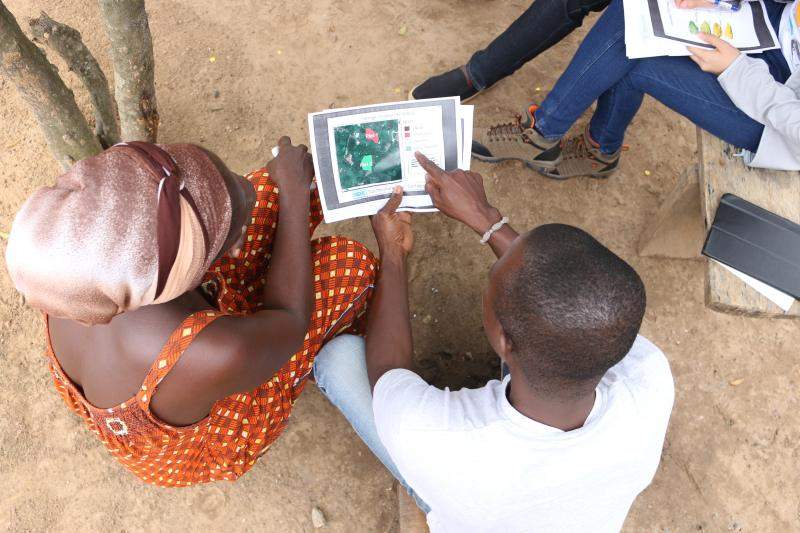Editor’s Note: Teun Smorenburg is program officer for the SAT4Farming initiative at the Rainforest Alliance. Here he writes about the new Ag Tech Developer Challenge focused on cocoa.
Smallholder farmers produce the vast majority of the world’s cocoa, the basic ingredient for chocolate. Cocoa farmers face daunting challenges: declining yields, mounting threats from pests and disease, and persistent poverty. Unfortunately, farmers rarely get timely training, advice and the financial means they need to change their circumstances.
To help farmers overcome those challenges, the Rainforest Alliance, along with other partners, set up SAT4Farming. This is an initiative to reach thousands of small-scale cocoa producers with tailored, individualized digital Farm Development Plans (FDPs). FDPs guide these smallholder cocoa farmers over a seven-year period with the aim of increasing their productivity to up to 1,500 kgs per hectare (three times as much as current production levels). To make these FDPs more precise and cost-effective and deliver them to even more farmers, remote sensing technology presents a real opportunity. Remote sensing is the capture of images and data from drones, airplanes or satellites to glean insights about the land below.
Through remote sensing, deforestation in protected areas can be tracked. Farmers in the US, Europe, and Australia are already using remote sensing to conduct ‘precision agriculture’, which essentially means that farmers are able to optimize their returns on inputs while using fewer resources. Further, remote sensing also enables farmers to identify pests and diseases in a very early stage (sometimes even before they occur by identifying pest and disease-prone areas) and use pesticides and fungicides in a targeted way to deter them.
But, while it’s increasingly used for Western commodity crops like corn and soy, it has not been extensively used for cocoa production yet. To mobilize the innovative power of the remote sensing sector for cocoa, the Rainforest Alliance recently announced the Ag-Tech Developer Challenge – a call to remote-sensing, high-tech, and earth-observation companies to come up with an innovative and competitive idea for remote sensing applications for the FDPs.
Out of the 50 applications, the Rainforest Alliance, with the help of a high-level expert panel consisting of Ed Parsons, Geospatial Technologist of Google; Kim Frankovich, vice president cocoa sustainability of Mars Inc; Farouk Nyame, technical manager of the Cartography Unit in the Ghana Cocoa Board; and Daan de Vries, chief innovation and technology officer of the Rainforest Alliance, awarded two prizes: a €100K price for the winner CropIn and a €75K price for runner up 20Tree.ai.
The Indian company CropIn will start by developing its future-ready farming solution CocoaSense. This AI and satellite imaging-powered solution will make the monitoring of the current digital farm development plans for cocoa farmers more comprehensive. The Dutch team of 20tree.ai won the second prize. This artificial intelligence company impressed the jury with their thorough understanding of the Farm Development Plan and their innovative solutions. The innovations of both winners will be further developed and piloted with cocoa farmers in Ghana in the coming period.
This tech challenge represents just one example of how the Rainforest Alliance makes innovative and impactful use of technology to make responsible farming the new norm.
Image: A farmer and a field agent discussing the Farm Development Plan from Rainforest Alliance website.





